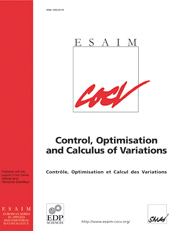Article contents
A Singular Perturbation Problem in Exact Controllability of the Maxwell System
Published online by Cambridge University Press: 15 August 2002
Abstract
This paper studies the exact controllability of the Maxwell system in a bounded domain, controlled by a current flowing tangentially in the boundary of the region, as well as the exact controllability the same problem but perturbed by a dissipative term multiplied by a small parameter in the boundary condition. This boundary perturbation improves the regularity of the problem and is therefore a singular perturbation of the original problem. The purpose of the paper is to examine the connection, for small values of the perturbation parameter, between observability estimates for the two systems, and between the optimality systems corresponding to the problem of norm minimum exact control of the solutions of the two systems from the rest state to a specified terminal state.
- Type
- Research Article
- Information
- Copyright
- © EDP Sciences, SMAI, 2001
References
- 5
- Cited by




